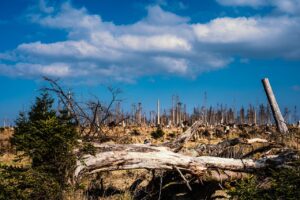Forest Ecophysiology Group is dedicated to quantifying fluxes between forests and the atmosphere and studying their responses to environmental changes.
Our team focuses on evaluating response patterns of trees and forests in either natural or urban settings at various temporal and spatial scales. Combining our expertise and collaborations with other experts, we ultimately aim to parameterize process-based models to predict future responses of forests under climate change scenarios.
Over the years, our group has collaborated with research institutions in Thailand, Sweden, France, and China, conducting studies mainly in tropical forests. Our dedication to understanding how forests respond to climate variability and change, as well as the performance of different species, allows us to provide valuable insights for forest management, conservation, urban greening, afforestation, and reforestation. Our research is broadly summarized into three aspects as follows.

Quantifying Fluxes
Using advanced techniques, we quantify the fluxes that occur between forests and the atmosphere, including water vapor, carbon dioxide, and some air pollutants. Our comprehensive analysis provides valuable insights into the responses of these fluxes to environmental changes on different temporal scales, ranging from sub-daily to interannually. By evaluating responses at leaf-, tree-, and forest-scale, we aim to modify and parameterize process-based and mechanistic models for predicting future responses under varying climate change scenarios.

Evaluating Responses
We assess the responses of forests to climate variability and change by conducting studies across various scales and conditions. Our research includes primary and secondary tropical forests as well as urban areas located in the heart of Bangkok. By analyzing the response patterns at the leaf-, tree-, and forest-scale, we gain new insights into how different species perform under changing environmental conditions. These findings are crucial for policy designs related to forest management, conservation, urban greening, afforestation, and reforestation.

Parameterizing Models
To accurately predict the future responses of forests under climate change scenarios, we ultimately aim to modify and parameterize process-based and mechanistic models. Our expertise in analyzing response patterns at different scales enables us to gather data and insights that are essential for model development. By using the results from our research, we strive to refine these models and improve their predictive capabilities through collaborations with other experts in the respective fields. This information is invaluable for policy-making, forest management, and conservation efforts.
For more details, view our publications here.
Our Vision
Our vision is to advance scientific understanding of forest-atmosphere interactions and contribute to evidence-based policy designs for sustainable forest management and urban greening.
Our Mission
We are committed to conducting innovative research to uncover new insights into the impacts of climate change on forests, and to serve as a knowledge hub for forest-related solutions in the face of global environmental challenges.